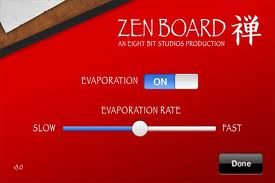Among the many Zen products in my office, the Zen Board is one of the most unassuming, tucked away in its corrugated cardboard envelope on top of a filing cabinet. This minimalist simplicity is part of the marketing appeal of the Zen Board (also called the Buddha Board). People can use water to paint whatever they want onto the plain white backdrop, then watch it fade away. It’s especially well suited to the kind of ink painting and calligraphy that has become associated with Zen, which is the key connection to the “Zen” label.
The Zen Board draws on the aestheticization of Zen that we can also see in rock gardens and the ubiquitous “Zen and/in the Art of…” genre. This understanding of Zen aesthetics does not incorporate the gilded opulence of many Chan/Zen/Sŏn monasteries, but is limited to black and white ink paintings and calligraphy, as well as the stark minimalism of rock gardens at places like Ryōanji. In the contemporary U.S., Zen minimalism still signifies aesthetic sophistication for many, though the rampant commodification of Zen might be diluting the brand.
Zen/Buddha Boards are marketed to bourgeois consumers as a way to de-stress. The “Original Buddha Board” has the tagline “master the art of letting go”; its Amazon.com page describes the $35.00 product in “Zen” terms:
Calm your mind while creating beautiful images. A Zen-like Etch-a-Sketch. Use the included brush to paint designs onto the board with water. As the water evaporates your image will fade, but will reveal a new perspective on your creative endeavors, encouraging the Zen idea of living in the moment. Stand, board and brush included.
Mini versions of the board are available in different colors, and many other companies sell competing boards with similar names. There’s even a Zen Board App that allows users to make temporary paintings on their phone or tablet screens:
These products, like most other Zen marketing, are presented as a respite from the daily grind. They promise at least a brief window of living in the moment, a breath of simplicity amidst the chaos of the workday. As such, they depend on this kind of hectic lifestyle (and capitalism in general) to justify their existence. Many product reviews on Amazon described the product as therapeutic, which also relates to the common associations between Zen and self-help. Products like the Zen Board reinforce the idea that Zen is an experience that anyone can have — at least, anyone with $35.00 to spend (or 99 cents for the app).


